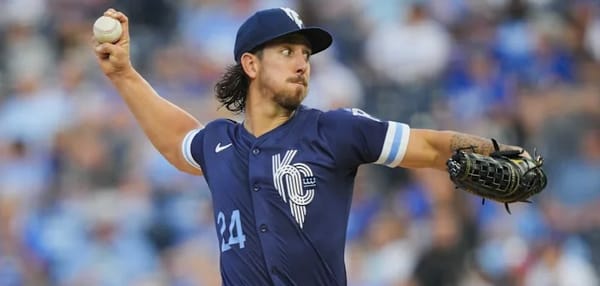The Colorado Rockies Have Called up Ryan Ritter. Now What?
It’s a new day at 20th and Blake
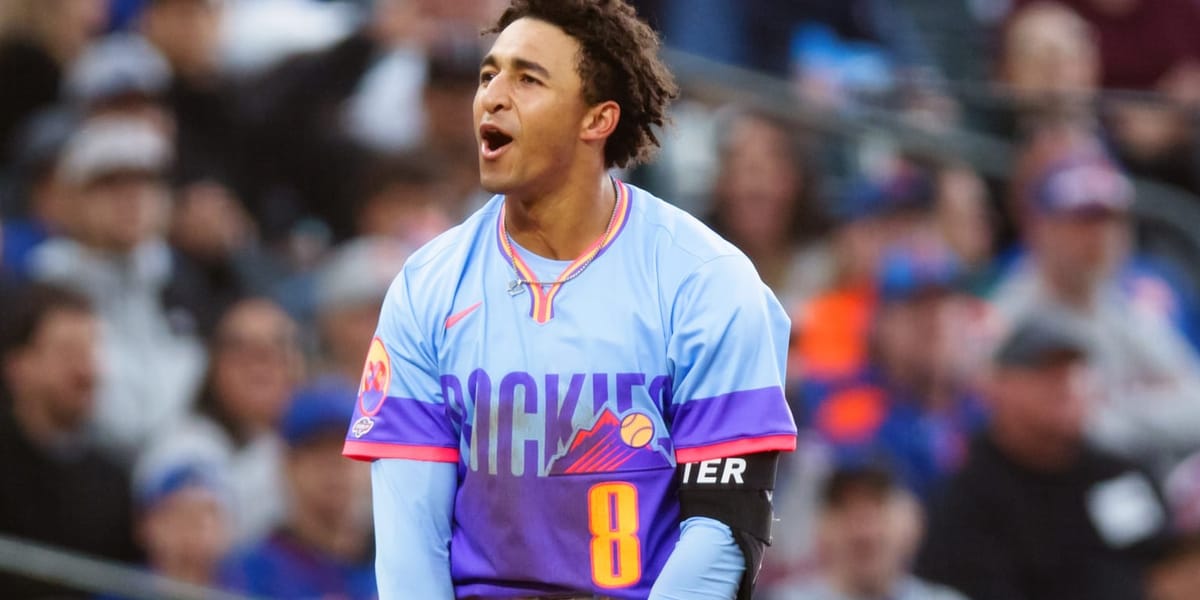
I realize I’m a day late with this newsletter, but upon hearing that the Colorado Rockies would promote shortstop Ryan Ritter, I wanted to wait a day until we’d seen his MLB debut.
That happened last night, along with this:
Ryan Ritter, Ladies and Gentlemen pic.twitter.com/pTMIwAnRZd
— Colorado Rockies (@Rockies) June 7, 2025
With that hit, Ritter became the first player in Rockies history with a first-hit triple. (For those keeping track at home, Ritter became the second Rockies player this season to log a base hit in his Major League debut after Zac Veen on April 4.)
Before moving into some background on Ritter, I want to call attention to the fascinating cognitive dissonance that’s emanating from the Rockies this season.
They are on track to be one of the worst teams in Modern Baseball history – and a lot of the press surrounding the Rockies right now focuses on that fact. (See here, here, and here, for example.) But to focus only on the record is to miss much of what’s interesting about this team — and if you are a Rockies fan, this is a pretty interesting team.
The Rockies are a notoriously insular and conservative organization. However, being historically bad has forced them to be proactive in ways that are atypical.
For example, they fired manager Bud Black, installing former third base coach Warren Schaeffer in his place. Schaeffer’s approach has been quite different, and although we do not yet know if his philosophy works, this is not the same Rockies team it was a month ago (despite the record).
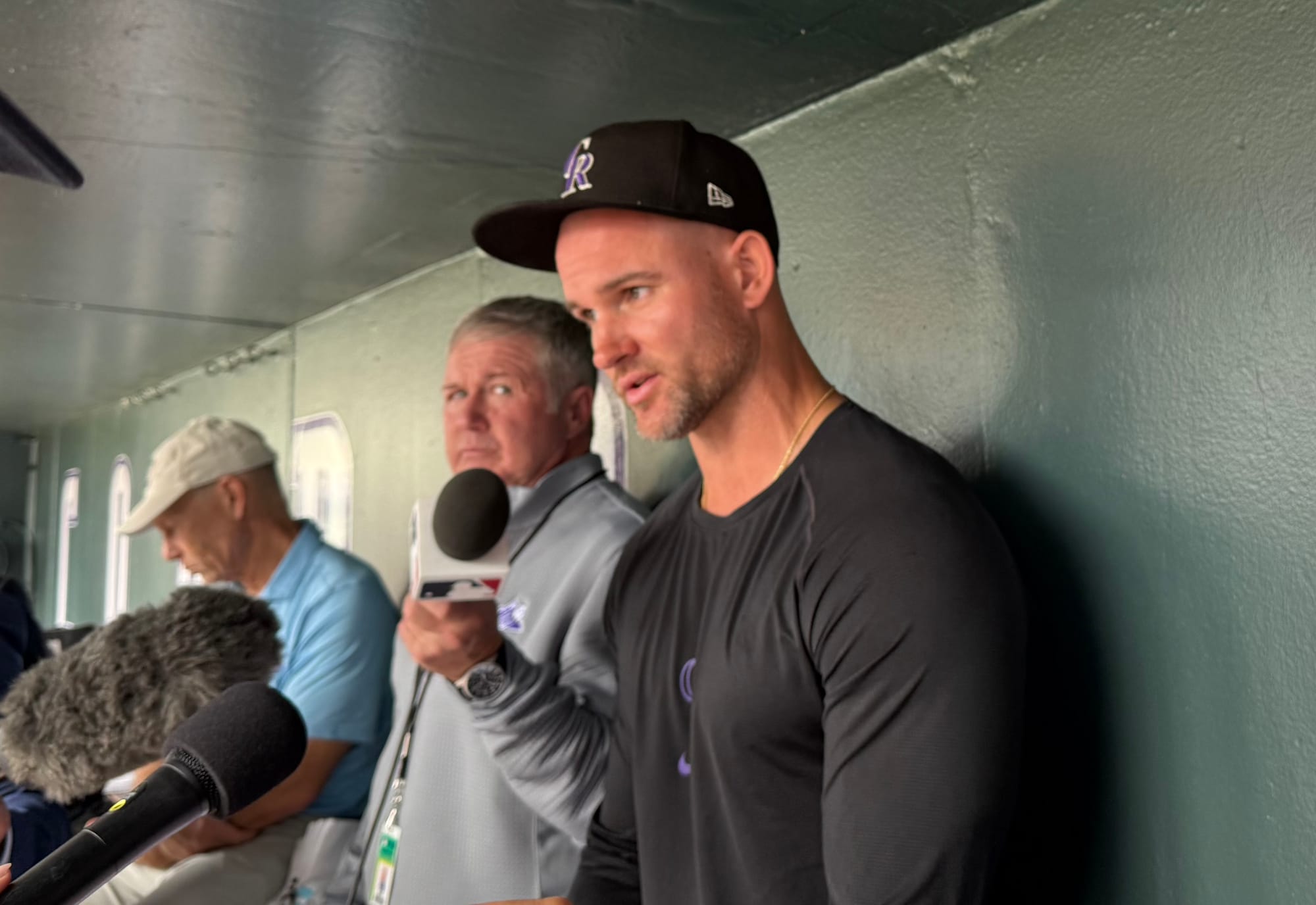
Here are a few examples:
• He’s handling the bullpen differently — Schaeffer does not overuse the bullpen. One of the hidden stories in this Rockies team is that over the last few weeks, the bullpen has been excellent, and part of that stems from Schaeffer’s discipline in deploying relievers. For example, under Bud Black, it was not uncommon to see Jake Bird pitch for three innings; Schaeffer only rarely uses him for two and often goes with just one. Such an overall approach should help with late-season bullpen fatigue.
• Schaeffer is resting players more — During the offseason, Bill Schmidt said they were trying to build depth to give players a day off. Under Bud Black’s leadership, however, those off days seldom happened. My own theory is that pitcher-centric Black wanted the best defenders in to protect the starting pitcher. That meant that Brenton Doyle, Ryan McMahon, and Michael Toglia would see themselves playing long stretches without off days, which resulted in fatigue late in the season.
Schaffer has taken a markedly different approach. Doyle and McMahon are getting off days, and I’ve wondered how much McMahon’s improved defense is the result of him being less fatigued. (To be clear, he’s always been a stellar defender, but this season, it looks like he’s being given additional recovery time and using it to improve defensively.) As another example, Schaeffer did not hesitate to bench Michael Toglia in an attempt to get him to retool his swing, even though doing so left the Rockies with a less-effective defender at first. Schaeffer is looking at the long term whereas Black seem to be focused on the moment.
Which is the best strategy remains to be seen.
• He’s deploying pinch hitters differently — Late in games, Schaeffer routinely changes his platooning to fit the situation. During last night’s game against the New York Mets, for example, Schaeffer did not hesitate to pull first baseman Keston Hiura for Sam Hilliard, a move that paid off. Clearly, that won’t always work, but Schaeffer’s willing to try, and there’s a sense that players are more confident when being placed in those situations simply because they have become more routine.
• The team has gotten younger — To be clear, this trend had already begun under Bud Black, but it has only continued with Schaeffer. (I have no idea how much influence Schaeffer has over these decisions.) When asked about the Rockies’ decisions to DFA Scott Alexander and release Jacob Stallings, Schaeffer did not hesitate to say in both cases, “We’ve decided to go younger.”
Given Bud Black’s preference for veterans, this represents a decided shift. (I cannot recall a Rockies team under his leadership that did not include a veteran catcher.)
What’s driving it? Probably a lot of things. Because the national media attention on the Rockies is so scalding, they are incentivized to try new things. Having Clint Hurdle back on the coaching staff probably helps given his work in the minor-league system for the last two years. He really knows these players. In addition, there’s surely a financial incentive. Playing prospects costs less than playing veterans, even those with small contracts.
But to return to the topic at hand, two weeks ago, the Rockies signed utility infielder Orlando Arcia — as I wrote last week, a baffling decision. Still, the Rockies decided to promote Ryan Ritter rather than use Arcia at short when Ezequiel Tovar went on the IL.
There is no doubt in my mind that Black would have played Arcia in the position at which he is most comfortable and had an All-Star season. But, as Schaeffer put it yesterday, the Rockies decided to go younger with Ritter. It’s worth gaming out the possiblities.
Quick Reminder: Who Is This Guy?
For some background on Ryan Ritter, I suggest reading this, this, and this.
The short version is that he was seen as a fourth-round, defense-fist shortstop out of the University of Kentucky. Then, he spent May absolutely tearing the cover off the ball and terrorizing the Pacific Coast League:
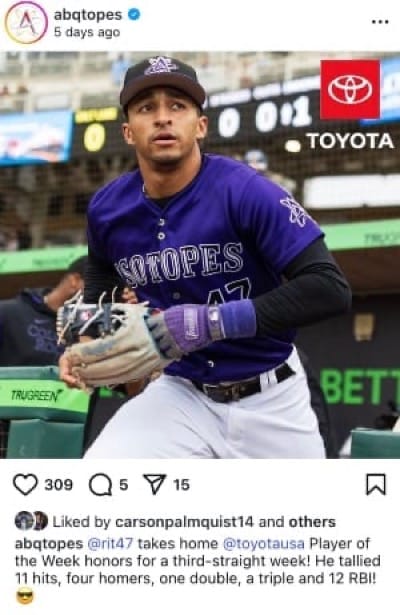
For a sense of his stat line, In May he hit 12 home runs, slashing .381/.445/.918 Over 24 games, he had a 17-game hitting streak. There really was no way for the Rockies to leave him in Albuquerque after Ezequiel Tovar suffered an oblique injury.
Yesterday when Ritter met with media prior to the Rockies first game against the Mets, I asked him if he’d talked with Tovar about playing at Coors. Ritter said they’d been around each other a couple of times, adding, “You know, he’s a great player and great to watch how he goes about his work.”
When I asked if there were some specific advice, Ritter, looked at me and said, “I don’t know. We just kind of talked it up, like mutual baseball players, like, just normal conversations, but game respect game.”
Enough said.
So What Does It All Mean?
Therein lies the question, and I think in the coming weeks, we’ll have a lot to watch. Thomas Harding has reported that the Rockies intend to let Ritter see significant playing time.
I suspect we’ll see him at short, his natural position, until he gets comfortable. (Last night in the ninth inning of the Mets game when Zach Agnos just needed a double play to get out of it, there was a second when Ritter crouched, mimicked picking up a ground ball and tossing it to Thairo Estrada to get the double play started. A more veteran player would probably not have done that.)
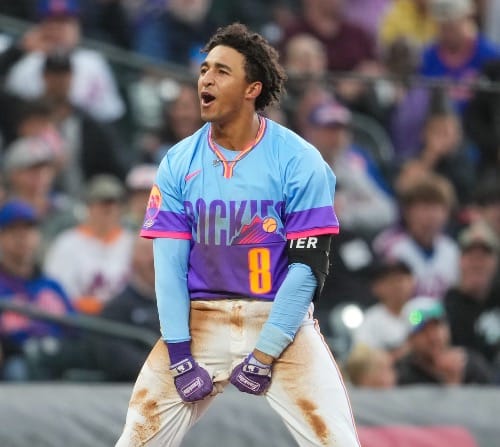
And when they know what Ritter can do, I think Rockies will begin to explore the possibilities. I will not be surprised to see him play some at third. Arcia has shown he has limitations there, and I suspect the Rockies are looking for someone to finish the season in Ryan McMahon’s stead should they trade him. Perhaps Ritter is that guy.
His promotion also speaks to the fact it’s a new day for the Rockies as they promote prospects at a rate that far surpasses the hopes of even the most-optimistic Rockies prospect devotee. It also shows that this is Warren Schaeffer’s team now.
Given their long-term commitment to Ezequiel Tovar, it may be the Rockies want to showcase what Ritter can do should they decide to use him as part of a trade. (Unlike many watchers, I expect the Rockies to be quite active at the trade deadline, but that’s a topic for another day.)
But to return to my earlier point, as a fan, watching the prospects learn is a lot more satisfying that seeing veterans on the downhill side of their careers. This feels like a new team struggling to be born, even amid the historic rubble, and that’s exciting.
This wasn’t the rebuild the Rockies wanted; rather, it was the one forced upon them. Where it goes, I have no idea. But in the meantime, even with all the losing, this is a very fun team to watch.
Closing Thoughts
I’ve run on too long, so that’s it for this week.
As always, thanks for reading, and feel free to share this with a friend.
Renee
★ ★ ★
Rockies Pitch is a newsletter that focuses on Colorado Rockies baseball. Find me on Bluesky at @Renee.Dechert.com.




